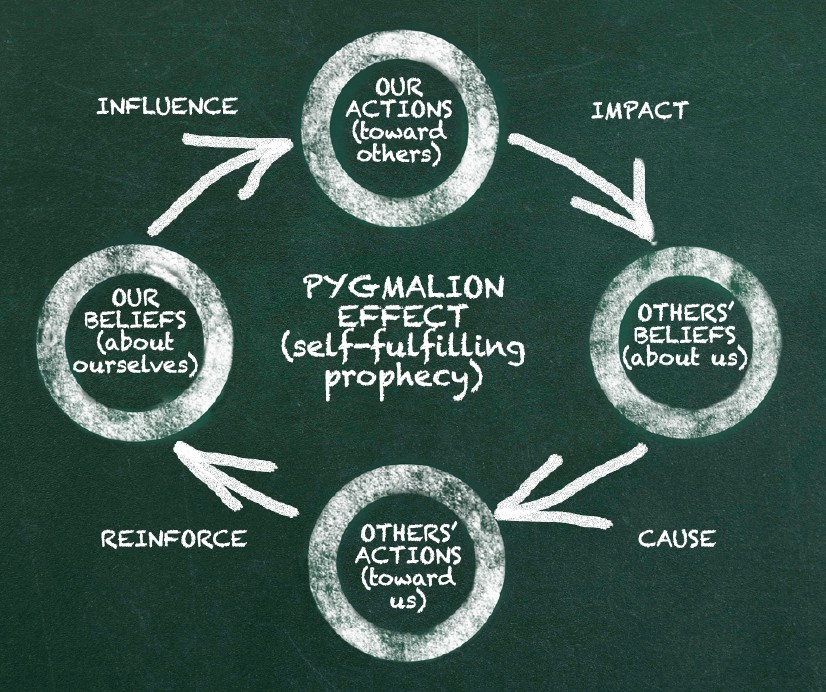 Photo by adrian on Unsplash
Photo by adrian on Unsplash
Higher expectations influence performance.
Positive reinforcement can lead to good results.
Those who expect more, get more.
Charles Kettering, once said, ?High achievement always takes place in the framework of high expectation.?
The opposite is true.
Low expectations undermine achievement.
Those who expect less, get less.
If you expect someone to perform poorly, there is a high probability they won?t deliver better results.
The Pygmalion effect, also know as the Rosenthal effect, is the phenomenon whereby higher expectations lead to an increase in performance, named after the Ovid tale of a sculptor who falls in love with one of his statues.
 Dan Bishop/Discover
Dan Bishop/Discover
Robert Rosenthal defined the Pygmalion effect as ?the phenomenon whereby one person?s expectation for another person?s behavior comes to serve as a self-fulfilling prophecy? (American Psychologist,Nov. 2003, p. 839).
The work of Robert Rosenthal and Lenore Jacobsen (1968), among others, proved that teacher expectations influence student performance.
?When we expect certain behaviors of others, we are likely to act in ways that make the expected behavior more likely to occur.? (Rosenthal and Babad, 1985)
Rosenthal studied covert communication to prove the Pygmalion Effect: the nonverbal language of vocal tone, facial expressions, posture and gestures that make up the bulk of human expression.
Here is a description of the original study:
Students took a test that was said to be able to identify ?growth spurters,? or those who were poised to make strides academically. Teachers were given the names of pupils who were about to bloom intellectually ? and sure enough, these students showed a significantly greater gain in performance over their classmates when tested again at the end of the year.
But here?s the thing: the ?spurters? were actually chosen at random. The only difference between them and their peers, Rosenthal writes, ?was in the mind of the teacher.? And yet the expectations held in the mind of the teacher ? or the parent, or the manager, or the coach ? can make an enormous difference.
Rosenthal proposed four key factors that could help explain how teachers? expectations influence students:
They boil down to climate (warm and friendly behavior), input (the tendency for teachers to devote more energy to their special students), output (the way teachers call on those students more often for answers) and feedback (giving generally more helpful responses to the students for whom teachers have the highest hopes).
Research conducted since Rosenthal and Jacobson?s original study has determined that the Pygmalion effect applies to all kinds of settings, from sports teams to the military to the workplace.
Statistics How To explains:
The Rosenthal effect, also called the Experimenter Expectancy Effect, is a special case of the Pygmalion effect that pertains to experiments and experimenter bias (Martin & McIntyre, 1994). If a researcher believes that their experiment is likely to results in a particular outcome, that bias will effect how the researcher conducts their work. The results will very likely sway towards the direction the researcher wanted, invalidating any study results.
In the workplace, management expectations of employees can also alter management behaviour, and subsequently affect staff results.
If you receive frequent recognition from your boss, you are likely to feel motivated and will tend to achieve an even better performance.
On the contrary, if you are continuously questioned and your work is ruthlessly criticized, the quality of your work can suffer.
If you expect the best in others, constructive criticism doesn?t have to sound like reprobation.
Don?t fill the message with negative connotations.
Other things like education level, life experiences, relationships with colleagues, and company culture can determine performance at work but don?t underestimate the power of positive reinforcement.
As a leader, you should hold positive and high expectations that your team will solve that difficult problem, meet those seemingly insurmountable challenges, and more often than not, they will meet or exceed your expectations.
Blaise Pascal, French philosopher and mathematician, said, ?Treat a human being as they are, and they will remain the same. Treat them as what they can become, and they will become what they can become.?
Excellence can be cultivated and nurtured
When you model life and work this way, you are clearly sending a message to yourself that excellence is the expectation.
It can be difficult to deliberately change your expectations of others.
But you can consciously change your behavior to bring out the best in your relationships at home, and at work.
The Pygmalion effect is an interpersonal motivational phenomenon
Contrasted with the Pygmalion effect is the negative Golem effect, in which lowering manager expectations impairs subordinate performance.
High expectations are too important to be left to chance; they should be built into your relationships to get more and give more.
In How to Win Friends and Influence People, Dale Carnegie recommends, ?Giving others a great reputation to live up to.?
Positive reinforcement is a powerful tool.
Set high expectations for yourself and others.
Challenge yourself with more difficult goals and tasks in an effort to rise to meet the challenge.
With positive thoughts and expectations, you look for evidence to support your beliefs, and slowly, your beliefs for yourself and others become reality.


